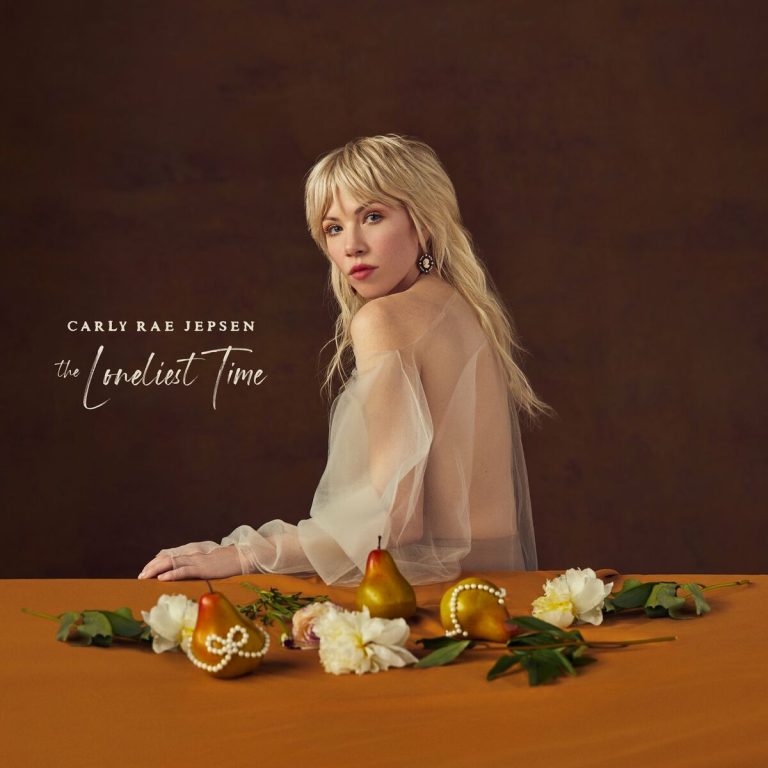In a pop landscape awash with bland simulacrum of authenticity, instant earworms for TikTok attention spans, banal hooks and strained ‘atmospheric’ conceptual records from overly sensitive artists steadily eroding into unironic and painful self-parody, Carly Rae Jepsen is something of a rarity. She’s hardly unique, but where some (and you know who I mean) are busy encoding and re-encoding versions of themselves within an inch of queerbaiting or as **serious** artists, Jepsen just goes about her business and writes honest-to-goodness pop bangers.
Assurance has always been at the centre of Carly Rae Jepsen’s best work. The need for another to shift the pattern of their life to call her (maybe), to run away with her, to appreciate that there’s no drug like her – these are the driving forces in Jepsen’s lyrical back catalogue that can be considered her auteur traits. In love with the idea of love as a source of validation, there are few better lyrics that encapsulate such a feeling than “Before you came into my life / I missed you so bad” from her mega-hit “Call Me Maybe” (which some poor souls still think make her a one hit wonder).
With The Loneliest Time, Carly Rae Jepsen took the lockdown period over the last few years to reflect on this overly reliant and co-dependent aspect of her personality and seek some degree of comfort in her own skin and company. The result is what she declares as her most honest and open work to date. The promise of a new direction to the record was heralded by some fairly uninspiring singles released that, truth be told, didn’t really elevate my interest for the record. How those same songs sit so well and are given new life in amongst the album as a whole is anyone’s guess. Witchcraft? An excellent ability to construct a body of work that ebbs and flows fluidly? Poor decisions from the marketing department? I mean, “Surrender My Heart”, then “Far Away” and then “Bad Thing Twice” should have been the order of the promotional singles, but we are where we are.
“Surrender My Heart” opens the record and hits the tone of confessional biography with the focus on the need for that most obscure and often downright unobtainable quality in a relationship: honesty. The weakness often exhibited in her lyrics through the years is put into painful context with the record’s opening lines of “So I’ve been trying to open up / When I lost someone it hit me rough / I paid to toughen up in therapy / She said to me, ‘Soften Up’.” Her honey-rich vocals seep with a sense of eerie inevitability that the desire to surrender her heart and to be open will eventually fail.
It’s a great opener and is up there with her best pop anthems. The lyric “But the benefit of all the broken hearts / That I broke before they could break me” is pure CRJ distilled into two lines – the knowledge that a pre-emptive strike is often the best in matters of the heart. “Talking to Yourself” returns to the same ideas of invisibility in a relationship as was made so evocative on “When I Needed You” from Emotion, while “Joshua Tree” is an ode to being in the moment as opposed to fearing what might come or bemoaning what has been. There’s a fair degree of brevity to the writing as none of the points are laboured and few choruses are repeated to their detriment – it isn’t until the seventh song “Bends” that we get a track that goes over the three-minute mark.
“Go Find Yourself or Whatever” is one of many highlights on the record, and sounds like (wait for it) Stevie Nicks singing with Sparklehorse. Well, sort of. It’s a pensive ballad about the acceptance of separation while still in the deep grip of love. After offering the lines “I wake up hollow / You made me vulnerable / So go find yourself or whatever / I hope it treats you better than I could do” there’s a final twist in the tail with the delayed delivery of “And I’ll wait for you”. This isn’t the same person who once sang about just going to the store and never being seen again.
Jepsen is a voracious writer, with sketches for around 100 songs being written for this record (which is about half of what she played with for 2019’s Dedicated). With that array of choice it’s a shame there are a couple of tracks here that don’t quite meet the quality of the rest. “So Nice” is fairly tepid, while the record’s title track is a curio for Jepsen’s writing in general as it’s clear what the aim was but it just doesn’t land. Featuring guest vocals from fellow Canadian Rufus Wainwright, there’s a The Boss-style Diana Ross disco vibe underscoring the track but it doesn’t quite stick, neither as homage nor camped up parody.
Where The Loneliest Time works best is in its ability to provide sheer, plain honest fun (remember that, folks, fun?). Where others in the pop arena are desperate to be read as providers of sub-text and cryptic lyricism that’s contrived and amounts to little, Jepsen is the queen of unadulterated surface-level exuberance. The run of five exhilarating pop gems that open the record are testament to her uncanny skill in creating shiny bangers that at once sound familiar and refreshing. And when did we all get too cynical for that to be anything other than an excellent thing?

